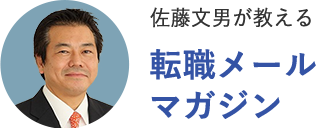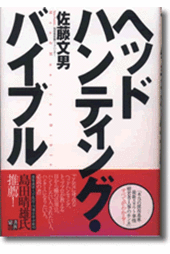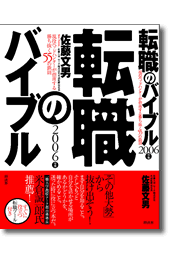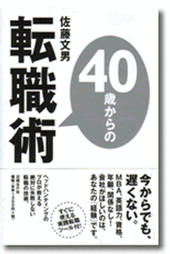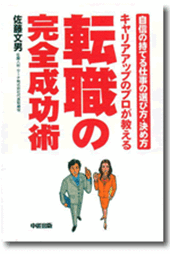Recent Trends
April 23, 2006
| 01 | With the Nikkei now above ¥17,000, it’s starting to be generally recognized that Japan’s economic recovery is genuine. Encouraged by this optimistic mood, many companies are expanding their hiring of both new graduates and mid-career workers. In view of the fact that more mid-career positions are opening up and people are enjoying greater opportunities to change jobs, we can therefore say without exaggeration that a golden age has arrived for those who wish to make a mid-career job change. |
|---|---|
| 02 | Japanese banks in particular, which have gotten a handle on their bad loans, as well as other financial institutions, are pouring their efforts into recruiting not only new graduates but also mid-career employees. This trend extends beyond the financial sector, however, and we are starting to see intensified competition in all business fields for superior human resources, whether they be young graduates or experienced workers. Among financial institutions, which are placing particular emphasis on hiring mid-career recruits, it seems likely that we will see a “U-turn” phenomenon in which employees will transfer from foreign-owned financial institutions to Japanese-owned ones. |
| 03 | Companies are generally increasing their 2007 recruiting quotas with the intention of increasing their hiring of students who graduate in the next fiscal year. Their informal decisions are therefore being made at a faster pace than last year, with nearly everything expected to be settled by around Golden Week in early May. It won’t be unusual for students to be accepted at multiple companies, a situation that hasn’t been seen since around 1990, at the end of the bubble economy era. Compared with last year, we can expect to see many more companies failing to achieve their recruitment goals, leading to a generalized practice of either implementing additional recruiting programs in the fall or hiring throughout the year. |
| 04 | Looking at mid-career recruitment from the perspective of personnel search (scouting) companies, the current trend toward greater numbers of positions fueled by the reviving economy will translate into extremely favorable treatment of highly capable personnel. This will probably lead to a decline in the number of people who actively seek out new employment positions for themselves. This is probably the reason why companies that specialize in registration-type personnel introductions, as well as large-scale job-hunting sites, have recently been putting greater effort into PR activities designed to promote new registrants. |
October 31, 2005
| 01 | With the Nikkei hovering around ¥14,000, the Japanese economy is showing an optimistic mood and businesses are looking with great zeal into hiring new personnel against an expansionary backdrop. The city banks are in the news because they’ve revived their practice of hiring of people in mid-career, but they’re not the only ones. We can say with confidence that a good employment environment has been established at all companies, from large corporations to small (venture) and medium companies, for people who are changing jobs. It seems likely that human resources will become increasingly fluid through the beginning of next year. |
|---|---|
| 02 | However, it is also true that a clear demarcation is emerging between “winning” and “losing” companies. This means that, even in a strong industrial sector like the automotive industry (as represented by Toyota), there are companies like Fuji Heavy Industries which are planning to cut their work force. We can expect increased mergers and acquisitions in the future, which are likely to prompt some companies to undergo such restructuring programs as early retirement, even in sectors that are otherwise enjoying a rising trend. |
| 03 | Companies are actively seeking to hire the new graduates of the coming fiscal year, and they all will tend to hire more than before. Therefore, in a way similar to what happened during the bubble economy, graduates will be approached by more than one company and will have a choice as to which company they want to work for. We can truly say that the deep freeze in employment that began in the late 1990s is starting to thaw. |
| 04 | Companies are expanding their hiring of both mid-career personnel and new graduates. Some companies who are not achieving the results they had hoped for with mid-career hires are shifting their focus to new graduates and putting energy into long-term planning for them, despite the fact that about a third of all new graduates who are hired end up quitting within three years. |
April 30, 2005
| 01 | Although the Japanese economy is at a turning point, economic recovery is supported by strong growth in other Asian economies and is likely to progress smoothly in the foreseeable future. While circumstances vary by industry, firms are generally positive about recruiting and opportunities for new graduates and mid-career job-seekers are like to continue expanding for the time being. |
|---|---|
| 02 | Mid-career hires are increasing in every industry and in all scales of business, from major corporations to small and medium-sized firms. However, employers are demanding higher skills year by year and are no longer prepared to compromise on the quality of the people they hire. Therefore companies will probably continue to face the dilemma of wanting to hire more staff but not being able to. |
| 03 | Many of next year’s new graduate job-seekers will clear a major hurdle by the end of the Golden Week holidays in late April/early May. Over the last year or two a clear trend has emerged whereby company interviews peak in April and are mostly completed by the end of Golden Week. |
| 04 | Given the dilemma companies face of being unable to recruit mid-career personnel in accordance with their plans, we are likely to see more employers taking a long-term view of human resource development and shifting their focus to hiring new graduates, even though it takes time before such employees come up to speed in the workplace. |


 日本語
日本語
